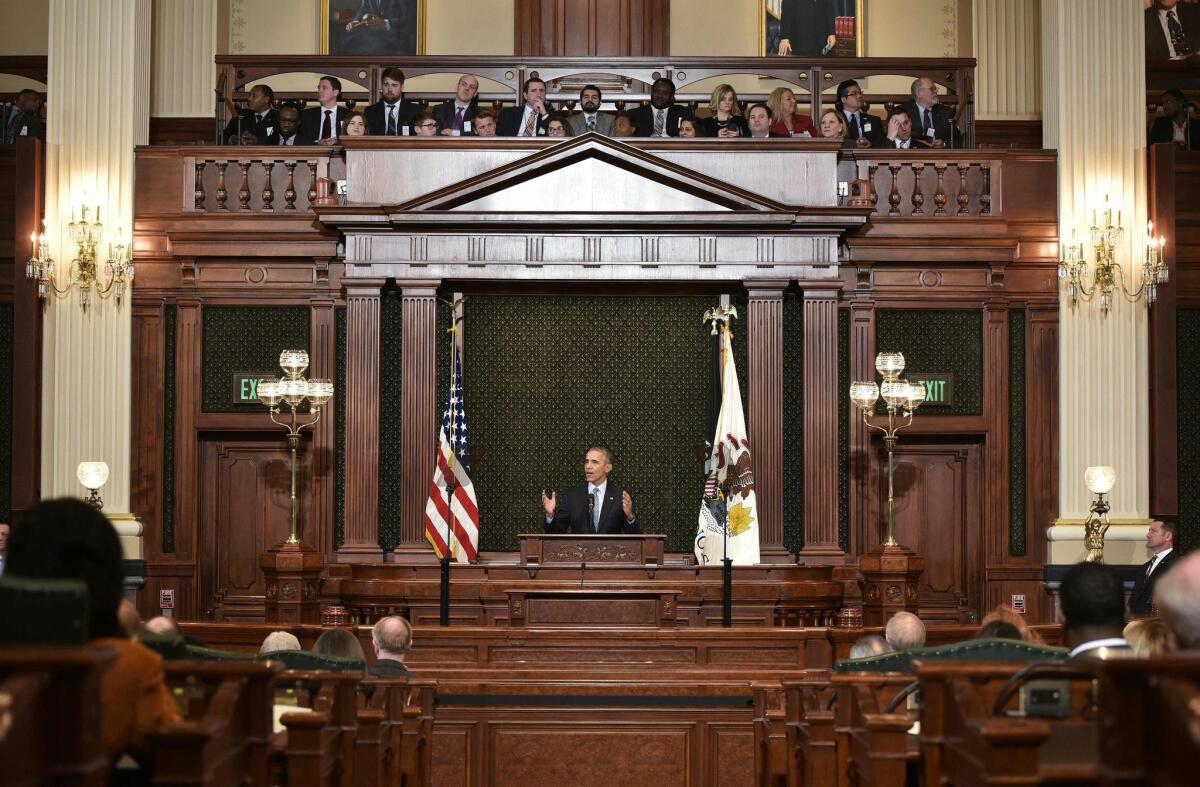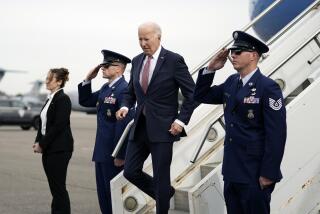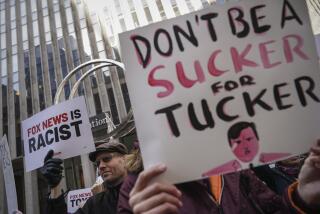Returning to his roots, Obama calls for an end to ‘poisonous political climate’

President Obama addresses the Illinois General Assembly in Springfield on Wednesday.
Returning to the message of hope that propelled him from the Illinois state capital to the White House, President Obama on Wednesday invoked Abraham Lincoln’s warning that a house divided could not stand and called for structural changes to improve the country’s political discourse.
In an address to the same Illinois Legislature where he once served, and in the city where nine years earlier to the day he had launched his presidential bid, Obama accepted responsibility for his failure to “reduce the polarization and meanness in our politics,” even as he fondly recalled the collaborative nature of his work as a state senator.
He warned that the “poisonous political climate” was a growing threat and said he still believed in a “politics of hope.”
“In a big, complicated democracy like ours, if we can’t compromise, by definition we can’t govern ourselves,” he said.
The president’s trip to Springfield was a nostalgic one, including a stop at a restaurant he frequented during his legislative service and recollections about some of the “hazing” he faced in his early days under the dome.
He spoke privately to aides about the good old days in Illinois when Republicans and Democrats worked together — and when he, a liberal black urban lawmaker, reached a deal on a law to fight racial profiling with the white Republican ex-Marine who ran the Senate with an iron fist.
In his speech, Obama bemoaned how political insults have become the norm, how bipartisanship is penalized rather than rewarded, and spoke of other challenges posed by the influence of money and a balkanized media environment.
“We’ve always gone through periods when our democracy seems stuck, and when that happens we have to find a new way of doing business,” he said. “We’re in one of those moments.”
He said his message was meant for both parties, and at times playfully admonished the Republican and Democratic lawmakers in the chamber for applauding his comments only when they served their own goals.
Twelve years after Obama left Springfield, the state body has turned radically partisan, to the point that Republican lawmakers march in lockstep with their GOP governor in stolid opposition to the Democratic-led House and Senate.
Even in this rural capital famous for wheeling and dealing among partisans of all demographics, the reality today is a far cry from the hopeful picture Obama presented during his first presidential campaign, when he declared that America is neither red nor blue, and “not as divided as our politics would suggest.”
While he did not directly address the presidential campaign, at times he seemed to refer to the rise of candidates challenging the party establishment.
“We’ve got to build a better politics, one that’s less of a spectacle and more of a battle of ideas,” he said.
Join the conversation on Facebook >>
At one point, he seemed to echo Hillary Clinton’s criticism that Sen. Bernie Sanders’ ideas are admirable, but often unrealistic.
“When either side makes blanket promises to their base that it can’t possibly meet,” he said, “that kind of politics means that the supporters will be perennially disappointed. It only adds to folks’ sense that the system is rigged, and it’s one of the reasons why we see these big electoral swings every few years.”
Building on the message of his State of the Union address last month, Obama called for specific changes in the political system, including campaign finance reform, national redistricting and expanded voting rights, like same-day registration and early voting.
But that would do only so much, Obama said, calling for a “modicum of civility” between the parties.
“The way we respect — or don’t — each other as citizens will determine whether or not the hard, frustrating but absolutely necessary work of self-government continues,” he said.
Memoli reported from Manchester, N.H., and Parsons from Springfield.
MORE FROM POLITICS
New Hampshire exit polls display vulnerabilities for Hillary Clinton
Will Obama be the first sitting president to get up and dance on Ellen DeGeneres’ show?
Black votes matter in Democratic presidential race as campaigns shift to more diverse states
More to Read
The complete guide to home viewing
Get Screen Gab for everything about the TV shows and streaming movies everyone’s talking about.
You may occasionally receive promotional content from the Los Angeles Times.








